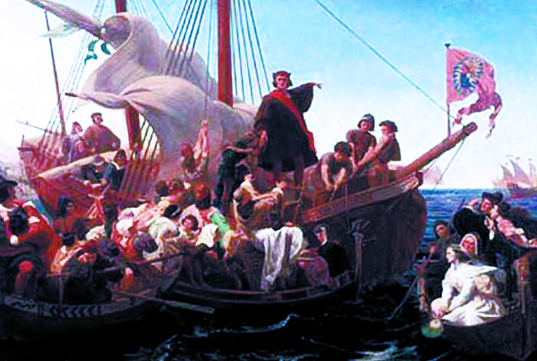The first voyage of Christopher Columbus to the “New World” is one of the most significant events in recorded history. The gateway from Europe to the continents of North and South America opened on the day that Columbus first set foot on the island know known as San Salvador. It was a day that can be equated to Neil Armstrong and Buzz Aldrin’s first steps on the moon, or the Wright brother’s first flight at Kitty Hawk, North Carolina. That first voyage resulted in change for all mankind. It is highly disturbing that the lasting contributions that the voyages of Columbus have had on the world have been attacked by some, but such is the case when ignorance has a voice. It is ironic because Columbus embodied enlightenment and dispelled ignorance on a monumental level.
Geographic ignorance pervaded Europe during the time of Columbus. Think of the land mass of Asia and what we know about the land, the cultures, the people and its history today; then try to imagine that five centuries ago, aside from hearsay and manuscripts written centuries before, you know nothing about the great Continent. That was the Europe at the time of Columbus. Navigation across a vast expanse of water was both difficult and dangerous. The Atlantic had been “a sea of darkness” and no one knew what lay beyond it, but the discovery of America soon made it a highway between the Old and the New World.
Christopher Columbus was a complicated figure. He had formulated his plan of navigation and for years sought funding for his expedition, such was his conviction. Was he an ambitious man – unquestionably! Brave, intrepid and bold, but he was also a deeply religious man. King Ferdinand and Queen Isabella sought the riches that could be generated from a direct route to the Far East, but they were also enlivened by the idea of bringing Catholicism to lands across the globe. Columbus was equally enthusiastic about this possibility. One should also consider the historical time frame. The Spanish Inquisition was in full swing at the time and even a civilized society would seem ruthless and backstabbing by our standards. It was nothing new. That had been the path to success for many ages of man. The Dark Ages may have ended, but enlightenment was only in its infancy.
On August 3, 1492, Columbus and his crew set sail from Spain in three ships: the Nina, the Pinta and the Santa Maria. On October 12, the ships made landfall, not in Asia, as Columbus assumed, but on one of the Bahamian islands. For months, Columbus sailed from island to island in what we now know as the Caribbean, looking for the “pearls, precious stones, gold, silver, spices and other objects and merchandise whatsoever” that he had promised to his Spanish patrons. He did not find much. In March 1493, leaving 40 men behind in a makeshift settlement on Hispaniola (present-day Haiti and the Dominican Republic), he returned to Spain to bring the news that land did in fact lay to the east; land that could be reached by sailing, as the great navigator had proven. He had embarked on his journey for the purpose of discovery and was hugely successful. Those who had come to America before had stumbled across it. There was no plan, no long-range objective, other than for food and shelter. Such happenstance does not qualify as “discovery.” Additionally, the civilizations in the New World had developed at a slower pace and were technologically thousands of years behind Europeans.
In the years following the establishment of the “Columbus Gateway,” the Crowns of Spain and Portugal funded many additional explorations. The areas of the Americas were slowly explored and the might of the more advanced European explorers led to their conquest of the lands. The ruthless nature of the Conquistadors was centered on opposing forces. On one hand, they were charged by the Crown to obtain whatever riches the lands possessed, but on the other hand, religious fervor meant that converting the natives to Christianity played a major role in the decimation of the native population. If the natives did not convert, then they would not be considered subjects of the Crown. If they were not subjects of the Crown, then they were the enemy. If they were the enemy, they were to be eliminated. Horrific – yes, but that was the way of expansion during the 16th century. Was Columbus responsible for this? Absolutely not. These edicts came from the Crowns of Spain and Portugal, with the backing of the Pope.
We should learn our lesson from Columbus and attempt to dispel ignorance. The world would be a far safer place if people were more like Columbus and explored facts to navigate successfully through myths and hearsay.





